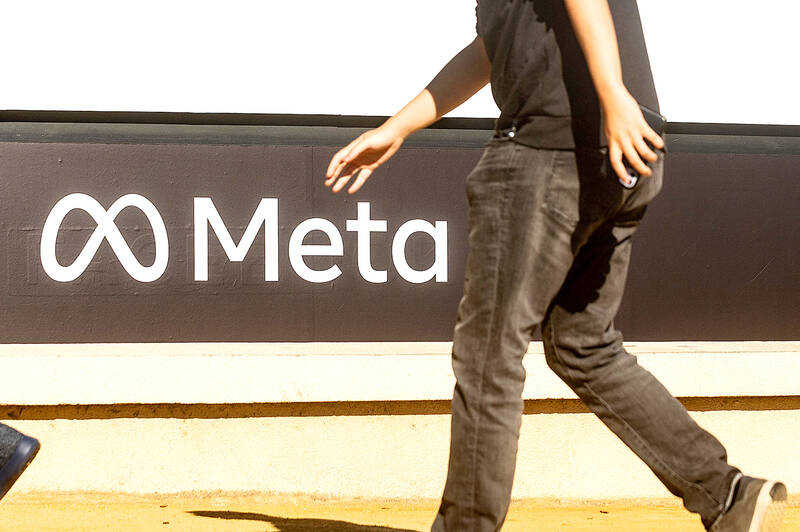Meta Platforms Inc on Wednesday reported quarterly profits that were well above expectations, brushing aside market worries that its heavy investments in cloud computing and artificial intelligence (AI) would hamper growth.
The company — which owns Facebook, Instagram and WhatsApp — reported a US$16.6 billion profit in the first three months of the year on revenue of US$42.3 billion, with business spending on ads remaining strong.
“We’ve had a strong start to an important year, our community continues to grow and our business is performing very well,” Meta CEO Mark Zuckerberg said.

Photo: AFP
“We’re making good progress on AI glasses and Meta AI, which now has almost 1 billion monthly actives,” he said.
Meta this week unveiled its first stand-alone AI assistant app, challenging ChatGPT by giving users a direct path to its generative AI models.
The company is putting AI to work throughout its platforms, from creating and targeting ads to recommending content for users, Zuckerberg said.
The solid performance comes as Meta defends its group of apps in a US antitrust case that could end with the tech firm ordered to spin off messaging service WhatsApp and photo-sharing platform Instagram.
About 3.43 billion people use apps in the Meta family every day, the company said.
Zuckerberg has denied in court that his company bought Instagram and WhatsApp to neutralize competitive threats, as alleged by the US Federal Trade Commission.
The earnings also come in the wake of significant shifts in Meta’s content policies that are apparently intended to endear the company to US President Donald Trump, including the termination of its US fact-checking operation on Facebook.
“Meta’s robust earnings show that the company’s advertising business remained healthy in Q1, proof that the controversial ending of its fact-checking program hasn’t done much to deter advertisers,” Emarketer analyst Minda Smiley said.
“But investors and onlookers alike will be much more concerned with what’s to come in Q2 and beyond, considering the wildly different economic environment the company now operates in because of Trump’s tariffs,” she said.
Analysts are keen to see whether the hefty US tariffs would prompt businesses to cut their online advertising budgets, thereby weakening Meta’s main source of revenue.
Meta has laid out plans for massive infrastructure investments, with expected capital expenditures of US$64 billion to US$72 billion for this year, primarily supporting AI initiatives.
“The pace of progress across the industry and the opportunities ahead for us are staggering,” Zuckerberg said on an earnings call.
“We are accelerating some of our efforts to bring capacity online more quickly this year, as well as some longer-term projects, and that has increased our planned investment for this year,” he said.

South Korea’s equity benchmark yesterday crossed a new milestone just a month after surpassing the once-unthinkable 5,000 mark as surging global memory demand powers the country’s biggest chipmakers. The KOSPI advanced as much as 2.6 percent to a record 6,123, with Samsung Electronics Co and SK Hynix Inc each gaining more than 2 percent. With the benchmark now up 45 percent this year, South Korea’s stock market capitalization has also moved past France’s, following last month’s overtaking of Germany’s. Long overlooked by foreign funds, despite being undervalued, South Korean stocks have now emerged as clear winners in the global market. The so-called “artificial intelligence

NEW IDENTITY: Known for its software, India has expanded into hardware, with its semiconductor industry growing from US$38bn in 2023 to US$45bn to US$50bn India on Saturday inaugurated its first semiconductor assembly and test facility, a milestone in the government’s push to reduce dependence on foreign chipmakers and stake a claim in a sector dominated by China. Indian Prime Minister Narendra Modi opened US firm Micron Technology Inc’s semiconductor assembly, test and packaging unit in his home state of Gujarat, hailing the “dawn of a new era” for India’s technology ambitions. “When young Indians look back in the future, they will see this decade as the turning point in our tech future,” Modi told the event, which was broadcast on his YouTube channel. The plant would convert

‘SEISMIC SHIFT’: The researcher forecast there would be about 1.1 billion mobile shipments this year, down from 1.26 billion the prior year and erasing years of gains The global smartphone market is expected to contract 12.9 percent this year due to the unprecedented memorychip shortage, marking “a crisis like no other,” researcher International Data Corp (IDC) said. The new forecast, a dramatic revision down from earlier estimates, gives the latest accounting of the ongoing memory crunch that is affecting every corner of the electronics industry. The demand for advanced memory to power artificial intelligence (AI) tasks has drained global supply until well into next year and jeopardizes the business model of many smartphone makers. IDC forecast about 1.1 billion mobile shipments this year, down from 1.26 billion the prior

People stand in a Pokemon store in Tokyo on Thursday. One of the world highest-grossing franchises is celebrated its 30th anniversary yesterday.